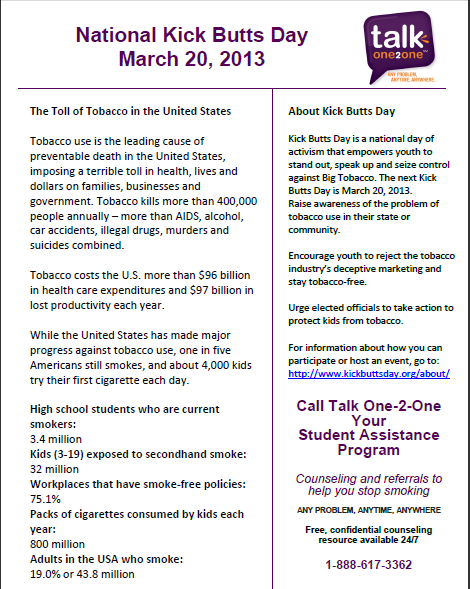October is dedicated to raising awareness
about many important health topics. National Health Observances recognizes each October health awareness topic
at http://healthfinder.gov/NHO/.
Please take a moment to promote your health and explore the October Health Awareness topics linked below.
Eye Injury
Prevention Month: www.geteyesmart.org/eyesmart/injuries/index.cfm
Health Literacy Month: www.healthliteracymonth.org
Home Eye Safety Month: www.preventblindness.org
National Breast Cancer Awareness Month: www.nbcam.org
National Bullying Prevention Month - www.pacer.org/bullying/nbpm/
National Down Syndrome Awareness Month - www.ndss.org
National Medical Librarians Month - www.mlanet.org
National Physical Therapy Month - www.apta.org/nptm/
Sudden Infant Death Syndrome Awareness Month - www.firstcandle.org
Mental Illness Awareness Week (October 7-13) - www.nami.org
Drive Safely Work Week (October 7-11) - www.trafficsafety.org
Walk to School Day (October 9) - www.walkbiketoschool.org/
Bone and Joint Health National Action Week (October 12-20) - www.usbji.org
Metastatic Breast Cancer Awareness Day (October 13) - www.nbcam.org
National Health Education Week (October 14-18) - www.sophe.org/nhew.cfm
National Latino AIDS Awareness Day (October 15) - www.nlaad.org
World Food Day (October 16) - www.worldfooddayusa.org
World Pediatric Bone and Joint Day (October 19) - www.usbji.org
International Infection Prevention Week (October 20-26) - www.iipw.site.apic.org/about
Respiratory Care Week (October 20-26) - www.aarc.org/rcweek
International Stuttering Awareness Day (October 22) - www.stutteringhelp.org
Red Ribbon Week (October 23-31) - www.nfp.org
World Psoriasis Day (October 29) - www.psoriasis.org
Health Literacy Month: www.healthliteracymonth.org
Home Eye Safety Month: www.preventblindness.org
National Breast Cancer Awareness Month: www.nbcam.org
National Bullying Prevention Month - www.pacer.org/bullying/nbpm/
National Down Syndrome Awareness Month - www.ndss.org
National Medical Librarians Month - www.mlanet.org
National Physical Therapy Month - www.apta.org/nptm/
Sudden Infant Death Syndrome Awareness Month - www.firstcandle.org
Mental Illness Awareness Week (October 7-13) - www.nami.org
Drive Safely Work Week (October 7-11) - www.trafficsafety.org
Walk to School Day (October 9) - www.walkbiketoschool.org/
Bone and Joint Health National Action Week (October 12-20) - www.usbji.org
Metastatic Breast Cancer Awareness Day (October 13) - www.nbcam.org
National Health Education Week (October 14-18) - www.sophe.org/nhew.cfm
National Latino AIDS Awareness Day (October 15) - www.nlaad.org
World Food Day (October 16) - www.worldfooddayusa.org
World Pediatric Bone and Joint Day (October 19) - www.usbji.org
International Infection Prevention Week (October 20-26) - www.iipw.site.apic.org/about
Respiratory Care Week (October 20-26) - www.aarc.org/rcweek
International Stuttering Awareness Day (October 22) - www.stutteringhelp.org
Red Ribbon Week (October 23-31) - www.nfp.org
World Psoriasis Day (October 29) - www.psoriasis.org




.jpg)